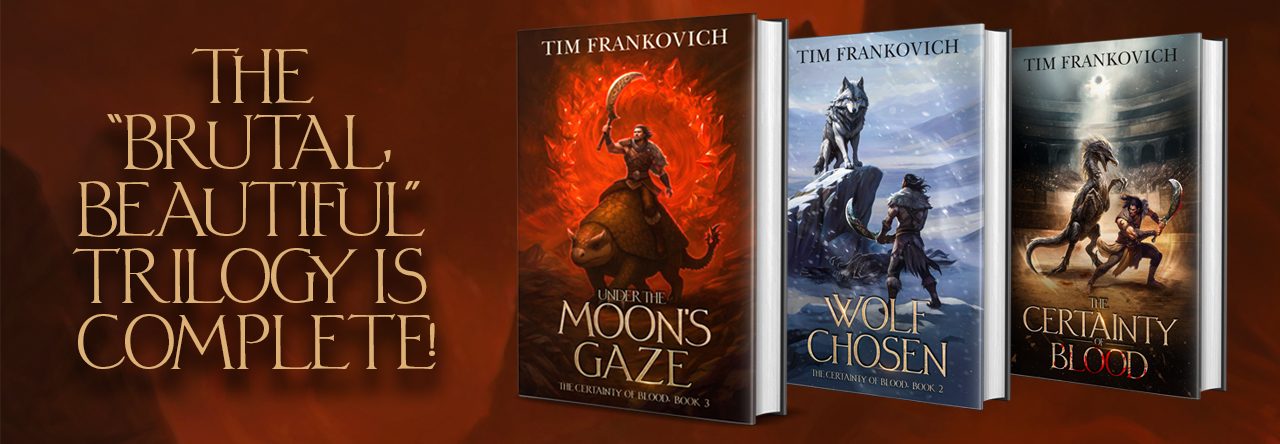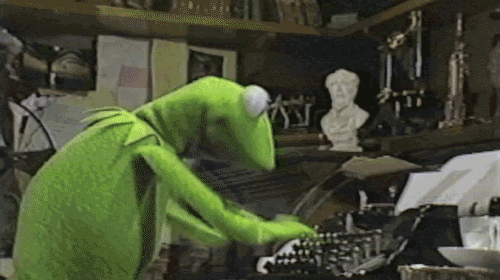
Just a quick update on my NaNoWriMo progress:
So far in November, I’ve written 27,569 words in 19 days. My average is now 1451 words per day. That’s dropped a bit, but is not surprising considering a lot of stuff that happened in the past two weeks.
The novel’s current word count is 88,323. It’s becoming more and more clear that the final length will definitely exceed 100,000. It’s taking these characters longer than I anticipated to get into position for the climax of the story.
Unless I see a huge surge in word count this coming week, I don’t think I’ll get a full 50K in. But that’s okay. I’m working hard every day and making significant progress. The novel will be completed, if not this month, then before Christmas, at least.
One of the biggest problems facing me now is patience. I’m eager to get this manuscript into some other hands to get their reactions. But I can’t do that any time soon. I’m well aware that the novel in its current form needs some editing/revising. I know of a few places that need significant revisions.
It’s coming, though. And if I pull off writing the climax as I anticipate it to be, I’ll be very happy. Almost there now…
Author: Tim Frankovich Page 14 of 16

It’s been seven days of November, otherwise known as National Novel Writing Month (NaNoWriMo, as the cool kids say).
In that time, I’ve written 10,435 words. That’s an average of 1491 words per day. It’s not quite at NaNoWriMo levels (that would be 1600), but it’s pretty good. It would be higher, but one evening I had a flat tire that took way too much time to resolve. I should have made that loss of time up on another day, but haven’t been able to do that yet.
The novel’s current word count is 71,204. I’m on track to break 100,000 by the end of the month if I maintain the current pace. I’d like to do better and break 110,000, if the book goes that long.
My initial target for this novel was 100,000 words. When I reached 50,000, it seemed right on track, because that was around what I considered the midpoint of the story. Now that I’m into the latter half, I’m starting to think it may be longer. There’s a lot of story left that may take more space to tell.
I’ll update the blog again in another week or so. This one will be difficult for numerous reasons, and the week after that includes Thanksgiving. November’s not the perfect month for this kind of thing, but what month is?
November is NaNoWriMo! Or, to use the full title: National Novel Writing Month! If you’re not familiar with that, it’s a challenge for writers, aspiring and otherwise. The goal is to write a full novel, or 50,000 words, during the month of November.
Last year, I took part in this challenge for the first time, writing 50,000 words in my YA fantasy, Viridia (which I finished a few weeks into December). It was my attempt to jump-start my writing, to actually accomplish something, and to prove that I could write at that rate.
It worked.
I didn’t sign up on the website or anything, but I made the goal and kept track of it. I updated some people and kept myself accountable, and I pulled it off. It was a great feeling.
As November approaches this time, I’m in the middle of my current novel. As I write this, I’m at 54,530 words, with a goal of 60,000 by the end of this week. While I’ve been working hard, I haven’t kept myself to a strong pace.
Ever since Hurricane Harvey derailed things, I’ve been slowly working my writing pace and schedule back into place. I’m generally achieving 1,100+ words per day this week.
My goal for NaNoWriMo this year is to finish this novel. If I write 50K in November, the book will reach 110K. I don’t think it’ll be quite that long (though I could be wrong). Therefore, if I accelerate to the pace of 1600+ words per day for November, I should be able to finish.
I’ll update the blog with the word count as I find time. Now, if you’ll excuse me, I need to figure out why this supporting character feels so creepy every time he walks into a room.
The Stormlight Archives, by Brandon Sanderson, is a series that inspires me and depresses me at the same time. As a reader, it inspires me and moves me in ways few stories do. As a writer, it depresses me, because if something this awesome exists, why should I bother?
Sanderson doesn’t need me to sing his praises. He’s a best-selling author many times over. If you enjoy fantasy and haven’t read his books, then what is wrong with you? Get to a library or Barnes & Noble right now!
Seriously. His writing is fantastic, and The Stormlight Archives are the best of the best. So far, there are two books (out of planned ten) in the series available, and the third one comes out in November. I’ve just finished re-reading the first two, to refresh my memory and whet my appetite for book three.
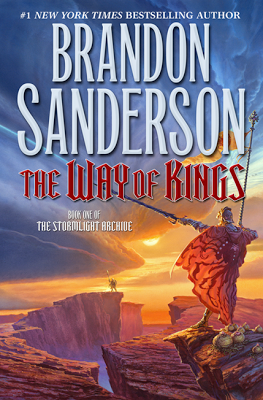
The first thing that awes me in these books is the worldbuilding. Many fantasy writers think they’re very clever when they devise a unique magic system, or do something unusual with language or flora & fauna. Some like to create a massive history of their world, in detail, going back thousands of years. Or maybe craft a fairly original mythology for their people, complete with ideas about religion or fantastical beings. Sanderson is not satisfied with doing one or two of those things; he does them ALL. He brings in the magic, the history, the peoples, the creatures, the mythology, the legends… and all of it connects. None of it is just thrown in for fun. There’s a logic to every element that makes it fit with all of the other elements. I am absolutely amazed at how much detail is packed into the world of Roshar. Just the ecosystem alone is incredible!
And if that weren’t enough, it’s only the tip of the iceberg. The world of Roshar is linked in with many of Sanderson’s other books in one grand mythology (cosmere). It’s practically overwhelming. If you’re not interested in that, it doesn’t interfere with the main story at all, but it’s an interesting aside. Fantheories go nuts over this, by the way.
Second, Sanderson awes me with his characters. There are times that I’ve seen magnificent worldbuilding, but the writer is horrible at portraying true-to-life people. Not so here. Kaladin, Shallan, Dalinar, Szeth… all of them are fascinating people with complete personalities. Kaladin, especially, is a protagonist to rival any in fantasy fiction.
Third, Sanderson knows the art of the surprise. More than that, he’s brilliant at hiding a surprise in plain sight! I absolutely adore it when something is revealed, usually at a crucial moment in the climax, and it’s something absolutely stunning that should have been obvious. (See the Mistborn books…)
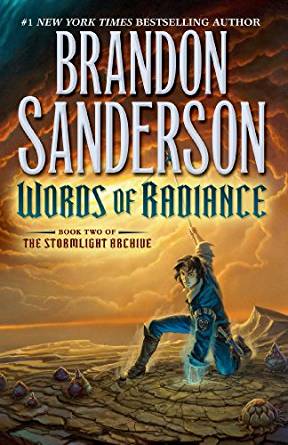 Speaking of the climax of the story… that’s where Sanderson is unbelievable. As a reader, I can’t wait to get to the conclusion of a Sanderson book, because I know it’s going to blow me away. Even when I already know what’s going to happen, I’m excited. While re-reading Words of Radiance, I was on the edge of my seat, so anxious to get to the climax… and I already knew what was going to happen! It’s not just action-packed; it matches up with the character arcs in beautiful ways.
Speaking of the climax of the story… that’s where Sanderson is unbelievable. As a reader, I can’t wait to get to the conclusion of a Sanderson book, because I know it’s going to blow me away. Even when I already know what’s going to happen, I’m excited. While re-reading Words of Radiance, I was on the edge of my seat, so anxious to get to the climax… and I already knew what was going to happen! It’s not just action-packed; it matches up with the character arcs in beautiful ways.
I find very little to complain about in Brandon Sanderson’s writing. Even though his books are very long, the pacing is usually spot on. In The Way of Kings, I’ll admit that I felt like it took a little too long to get to Kaladin’s story arc climax, but only just a little.
The Stormlight Archives are planned as a ten-volume series. I’m hoping for great things, but I’ll admit to a little nervousness about whether he can maintain the greatness for that long. The Wheel of Time, by Robert Jordan, was the picture of an epic series that lasted way too long for me. I felt like five or six books could have been left out and it would have been a better story. I sincerely hope I don’t feel that way when Stormlight ends.
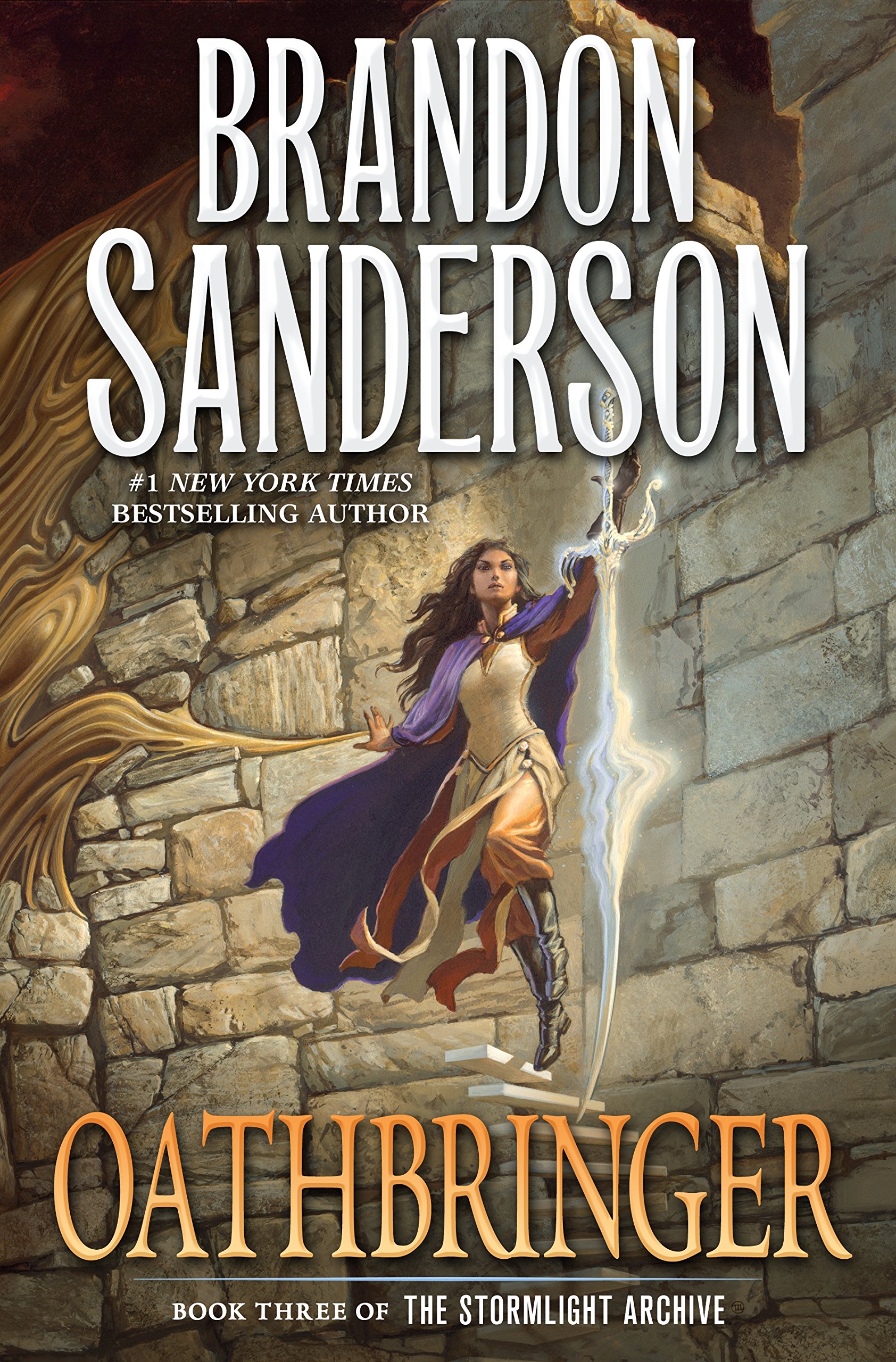
As a writer, I can’t help but feel intimidated by Brandon Sanderson. It feels natural to ask, “If something this awesome is being published right now, why should I even bother? I can’t match this quality.” Logically, I know this is a fallacy. I know it makes no sense. Convincing my emotions is another thing.
The stories I write are not the same as the stories Brandon Sanderson writes. I think they’re not as good. But that shouldn’t change anything. They’re my stories. I’m the one telling them. Even if no one else ever enjoys them the way I do, that’s okay. But maybe someone will. Maybe a lot of people will. I won’t know until I try, and try again.
![]() This picture shows a magnetic hurricane tracking chart. One exactly like this used to hang in my grandparents’ home. Almost every time we were there, one or more of us would mess around with the little magnets on it. And invariably, we would make a dotted line leading directly to the Galveston/Houston area.
This picture shows a magnetic hurricane tracking chart. One exactly like this used to hang in my grandparents’ home. Almost every time we were there, one or more of us would mess around with the little magnets on it. And invariably, we would make a dotted line leading directly to the Galveston/Houston area.
(In my parents’ home, we used the paper tracking charts that the news stations printed every year. No magnets to play with.)
If you didn’t grow up on the Gulf Coast, this is probably completely foreign to you. But tracking hurricanes was something that happened every year. Sometimes, those little magnets were vitally important. Sometimes, there were many of them, showing multiple hurricanes and storms moving throughout the Atlantic basin.
It was normal. It was the way we lived.
Today, with the internet, we can pull up the charts and tracks from the National Hurricane Center at any moment. We can see it on our weather apps. We’ve upgraded a little bit.
But the hurricanes are the same. They show up and cause devastation.
Harvey derailed most of our plans around here. We were extremely fortunate to be one of the homes in our town that did not flood (7,700 did!). But it’s played havoc with everything else in our lives. My business has taken a huge hit and may not recover. Hundreds of our friends lost part or all of their homes. We’ve all become experts at tearing out sheet rock and insulation.
I had a goal on my current novel writing to reach 50,000 words by September 9th. That didn’t happen. It still hasn’t happened. Harvey arrived two weeks before that day and everything changed. We lost tons of sleep, from which we haven’t fully recovered. We hurried out in the aftermath to help our family, our friends, our neighbors. Our church ran a shelter, organized work crews, and a distribution center. We have/had dozens of people from other states show up to help out. Writing, and many other things, got pushed to the background.
Normalcy, such as it is, is slowly peeking over the edge of reality, asking if it can come back. I don’t know. It might, but I think it’ll be changed. You don’t go through something like this without changing.
I’ve written a few hundred words in the past week or so. Starting to get back into my story. I thought I knew what was happening.
And then my protagonist did something totally stupid and almost got himself killed. That wasn’t in the outline.
Neither was Harvey. Huh. Art imitates life.
The writing has continued to be slow over the past couple of weeks. But I’ve now set myself a specific goal for hitting the halfway mark of the book. I’ll let you know if I reach it. In the meantime, here’s another glimpse into the writing process:
A couple days ago, I was driving home from the grocery store. As is sometimes common, I was going through an upcoming scene in my head. In it, my female protagonist is introduced to a significant minor character. He bows to her, and as he comes back up, he says something that only she can hear. But what does he say? As I turned the last corner leading to my house, the line came to me: “You have a star in your eye.”
 I had no intention of taking things in that direction. The line just popped into my head. And immediately, I knew the significance of it.
I had no intention of taking things in that direction. The line just popped into my head. And immediately, I knew the significance of it.
That one line changed everything. I won’t go into too much detail, so as not to spoil the book’s storyline, but here are some generalities:
I had thought I understood the character arc for this particular protagonist. I thought it was a decent arc and storyline. But this one line changed all of it. I suddenly understood how she connected to an entire fantasy race in the story. I suddenly understood her connection to the magic system of this world. And I immediately realized the potential of where this could lead by the time of the book’s climax.
One line of dialogue. One comment from a minor character. And it changed that much.
That’s the way writing goes sometimes. It doesn’t matter how much I plan things out, how much I outline, or how much I map character arcs. Sometimes, something just pops into my head, I write it down, and everything changes.
Don’t get me wrong: it’s not a bad thing. It doesn’t frustrate me. On the contrary, it excites me. Writing sometimes seems just as much a process of discovery as it is creativity. When I stumble into one of those discoveries, like this one, I feel a surge of enthusiasm for the story. I want to get this scene down and see where it leads. I want to discover what comes next. Ideally, future readers will hit this point in the story and feel the same way: What comes next?
I have nothing much to say here right now.
Things have picked up a little bit on the writing front. I’m over 22,000 words on the current novel. Continuing to get sidetracked by world building, especially names.
Funny things happen when you’re working on a huge book with lots of characters.
I had a couple of plot holes that needed filling. Then I realized that one minor character would fill those holes nicely. Then I realized that he would also provide a major turning point to the antagonist. Then I realized he wasn’t such a minor character any more.
I created another minor character just to have someone for one of the protagonists to talk with in a particular scene. Then I realized that I really, really liked this guy. And now he’s not so minor any more, either.
I have an outline of the big story, of course, but there is plenty of room for changes. Some writers follow a strict outline and some write from “the seat of their pants.” I’m somewhere in between. I like to know where the story is going, but I also enjoy being surprised.
I’m reminded of something J.R.R. Tolkien wrote in a letter, while he was hard at work on The Lord of the Rings:
“A new character has come on the scene (I am sure I did not invent him, I did not even want him, though I like him, but there he came walking into the woods of Ithilien): Faramir, the brother of Boromir…”
And we know where that part of the story went…
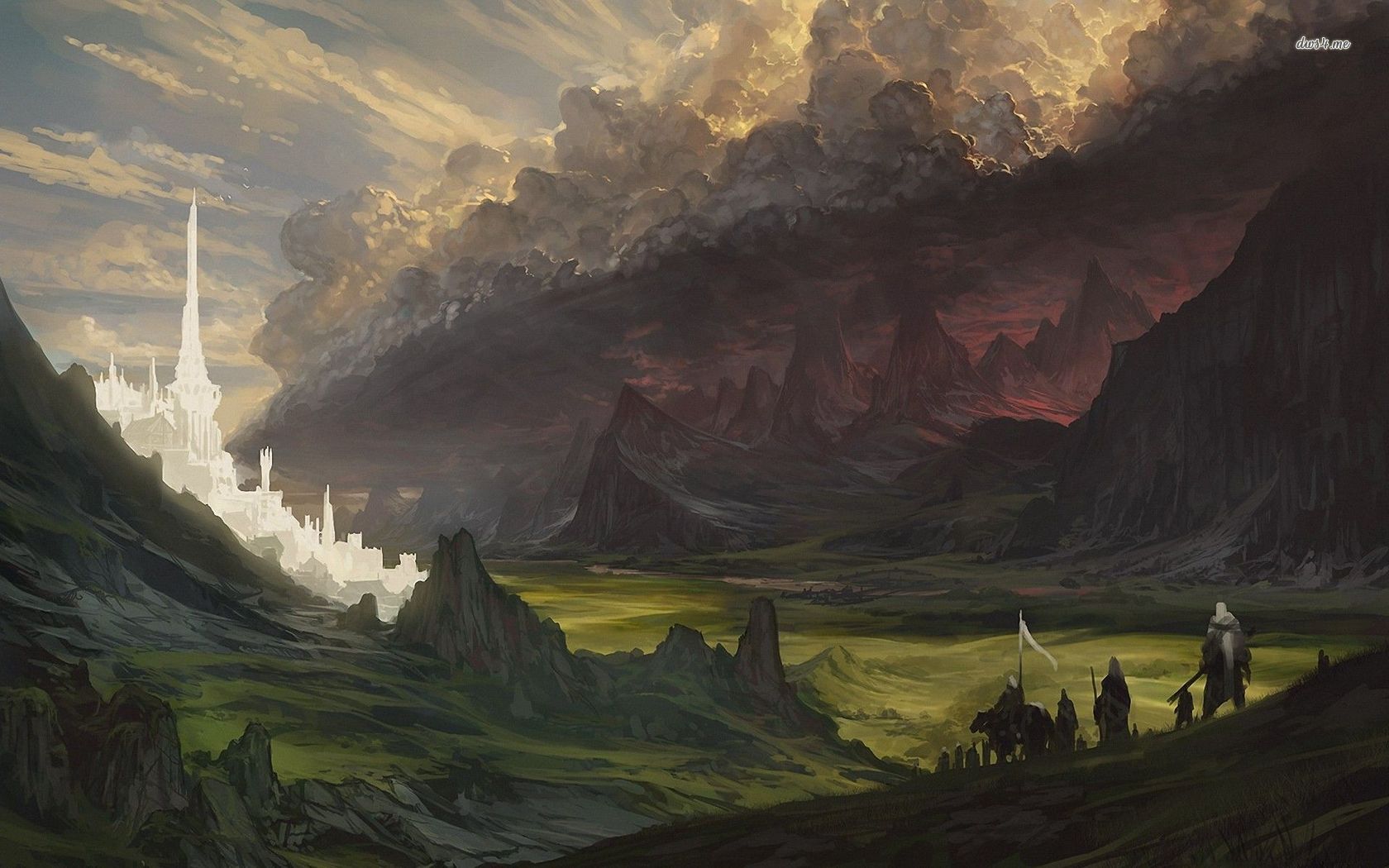
The new novel is coming along very slowly. I’m possibly around 11% through. This is proving to be far more difficult writing than the last one, and the main reason is worldbuilding.
For those unfamiliar with the concept, when crafting a fantasy or science fiction novel, a writer has to become, in J.R.R. Tolkien’s terminology, a sub-creator. It means making up everything about a world – culture, language, technology, development, religions, social classes, and so on. It means crafting enough of this new locale to be reasonably believable to the reader. (To be honest, many other genres do the same thing, such as novels set in an imaginary small town Americana, etc.)
Sometimes, a writer will skimp on some details while elaborating lengthily about others. For example, I was reading Patrick Rothfuss the other day and noticed that he almost never goes into any detail on describing clothing (Kvothe “put on his pants and shirt” is about it). Yet he goes into enormous detail describing the gesture-language of one group of people. Stephen Lawhead writes for great lengths about food.
The lengthy parts aren’t always necessary for a reader to enjoy the story. Sometimes, they’re an integral part of the story itself, but that’s actually kind of rare. More often, they simply add flavor, providing more “realism” to a location with which the reader is not familiar.
The problem is finding that balance. How elaborate do I get? How much can I skip over? Does the reader need to know the current clothing fashions in Arazu? What about the architecture of the city walls in Kuktarma? Or the details of language structure in Rasna? (These are all locations in my current work-in-progress.)
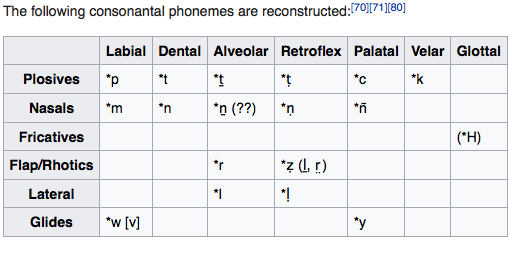
(No, I’m not getting THIS detailed… but I am reading things like this to learn more…)
Some things have to be there, no matter what. Since I’ve made the choice of having six distinct countries within this story, they have to be different from one another in more than just the location on the map. Characters from different countries have to have names that work with that country’s language/naming style.
I’m letting this kind of thing slow me down way too much. Yesterday, I stopped writing because I realized it was time to introduce two new characters and I hadn’t decided on names for them yet. I then had to decide which country they came from and try to work out their names. By the time I finished all that, I didn’t really want to keep writing any more. It was too much work. I found myself asking things like “Do I really need two characters here? Can I get away with just one? What if his name is just Bob?”
In some instances, I’ve done something that I should be doing more often: thrown in a placeholder name and kept going. “Find and Replace” is such a beautiful thing.
I’m writing this blog post primarily to motivate myself in this way. I need to get back to letting the words flow freely without stopping to obsess over worldbuilding. I can always go back and add that later.
I’ve really fallen in love with these characters and can’t wait for readers to meet them. But those characters live in a specific world and that world needs shaping.
As a child, I loved action figures. I started out with Micronauts and Star Wars, but in 1982, something special came along that changed everything. That something was GI Joe: A Real American Hero. Using the 3 3/4” scale of Star Wars, GI Joe was restructured into a military line that included all sorts of accessories and vehicles, far more than the 12” line could boast.
Seriously, the shining example of this was the USS Flagg – an AIRCRAFT CARRIER. At 7.5 feet long, this was the greatest toy ever manufactured. Don’t argue with me about this.
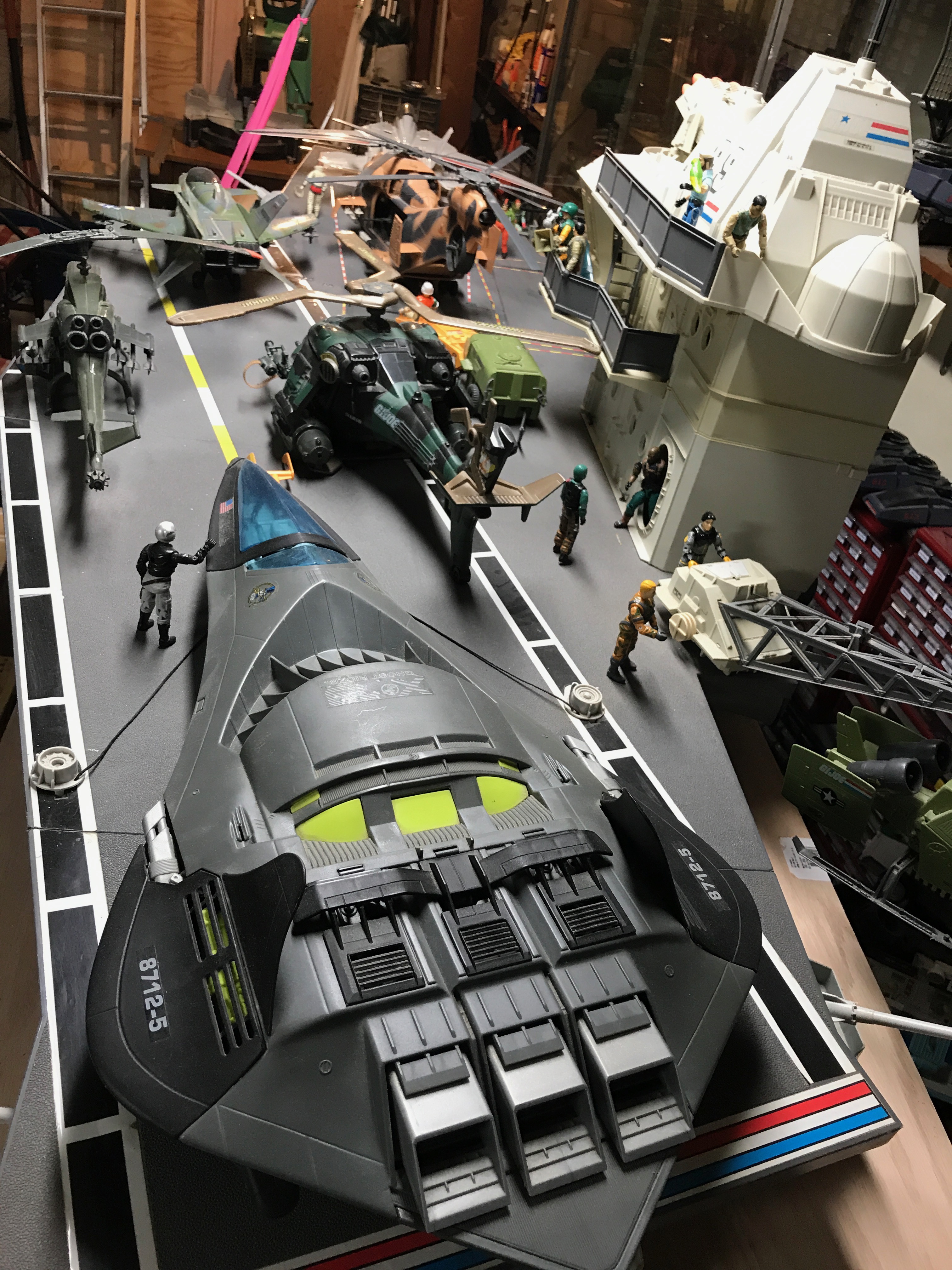
Most importantly, the toy line had characters – heroes and villains. From the first time I picked up one of the action figures in the store and read the “file card” on the back, my imagination was fired up. These weren’t just random “army men” like the little green soldiers. They were individuals with their own personalities and plans. As the line expanded and grew more diverse, those personalities were even reflected in their costumes.
The story possibilities were endless. The GI Joe comic book became the hottest comic of the 1980s. The cartoon was insanely popular. And while sharing the same characters, both comic and cartoon were completely different! There was that much room for variation.
Because of this, I could create my own stories. I didn’t have to copy the comic book or cartoon, though I could use them as a springboard. And that’s exactly what I did.
(It wasn’t until much later that I discovered that Larry Hama, the writer of the GI Joe comic books, had written the file cards. His writing of plots, conspiracies and action scenes continues to inspire me even today.)
With the exception of Lego, it’s hard to find toys like this on the shelf any more: toys that inspire and develop the imagination. I spent hours and hours with my GI Joes, setting up battles, crafting stories, and even making up my own characters to join in. I feel sorry for today’s kids that don’t have this kind of opportunity. Sure, they have video games I couldn’t have even imagined when I was little, but it’s not the same.
Wherever my writing career ends up going, it will always owe a debt to GI Joe, A Real American Hero.
Writing Update: I’m making progress on the opening chapters of the new book. Introducing main characters, themes and plots. Sort of like the first issue of a comic book…
I’ve been busy with many things over the past couple of weeks, and it won’t be slowing down until next week sometime. That’s my target for the start of my next writing project.
At this point, I don’t know what to do with Viridia, my YA fantasy. I’ve been seeking representation for it for a few months now and getting nowhere. The only reactions I’m getting are form letter rejections. There’s clearly something wrong with it, but I just don’t know what. I hesitate to try any more revisions on my own, because I don’t have concrete feedback upon which to base those revisions. There are plenty of freelance editors I could consult, but I don’t have the money for that. So for now, I’m setting Viridia aside and waiting.
I have three sequels planned and outlined for Viridia, but I’m not moving on to those until I know what needs to be revised in the first book. It would be a big problem if book three were based on a major plot point in book one that ends up getting completely changed, for example.
I’m also not moving directly to self-publishing, at least not yet. Something does need to be revised; I just don’t know what it is.
That means it’s time to write something else. While the past few weeks have been occupied with non-fiction stuff, I’m ready to start a new novel.
I’ve been brainstorming for quite a while now, doing some research on a few topics and concepts, writing out cultural details, voice journaling the major characters, and so on. When I get back from a big trip this weekend, I’ll dive right into it.
With the working title of Heart of Fire, this is more of the epic fantasy I always wanted to write. It’s still not the world I’ve had in my head since junior high, but it’s a world with characters that have captured my attention and creativity. There is a huge amount that I don’t know about this story yet, including whether it works as a stand-alone novel, or if it needs to be split up into a series.
But the characters and the world… I love it all. If I do this right, your heart will break for the primary protagonist, almost from the first chapter. I hope I do it right.
